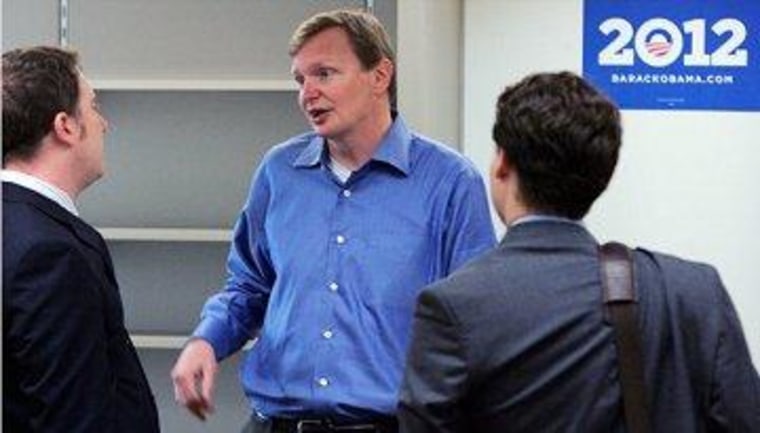For much of the year, millions of voters received frequent emails from Obama for America, invariably about one aspect of the campaign or the other. Nearly all of the messages involved fundraising, organizing, or some form of election-related activism.
With this in mind, it came as something of a surprise last week when Obama for America sent out a new, post-election message last week, which read, "Thanks to your feedback, we're taking immediate action on one of your suggestions: keeping you informed about how the President is fighting for you so you can continue to talk to your friends, family, and neighbors." The topic: ongoing talks about the nation's fiscal future, and President Obama's "concrete plan to reduce the deficit so we can grow the economy."
Jim Messina, the president's campaign manager, told reporters last week, OFA intends to do far more activism along these lines. "People just spent five years winning two elections together," he said. "They're not now just going to walk away."
The New York Times reports today on Team Obama's "second chance to keep his election-year supporters animated."
With lawmakers scheduled to return to work on Monday to begin intense discussions before a looming fiscal deadline, Mr. Obama's aides are trying to harness the passions that returned him to the White House, hoping to pressure Republicans in Congress to accept tax increases on the wealthy. The president's strategists are turning first to the millions of e-mail addresses assembled by the campaign and the White House.Already, supporters are being asked to record YouTube videos of themselves talking about the importance of raising taxes on the rich. Aides said those videos would be shared on Facebook and Twitter and would be forwarded to centrist Democrats, as well as to mainstream Republicans, who they hope will break with their Tea Party colleagues. [...]The president is planning rallies in influential states to remind supporters of the need to keep the pressure on lawmakers during the fiscal talks. And should negotiations break down, Mr. Obama's team is arranging for Republican lawmakers to hear from of tens of thousands of riled-up activists through angry Twitter posts, e-mails and Facebook messages.
There was a fair amount of criticism in 2009 and 2010 about Obama's team missing an opportunity. They'd created a small army of backers in 2008, but after the inauguration, the legions weren't asked to do much in the way of staying engaged and changing the political landscape.
It appears the president's team now intends to correct this mistake. The next question, though, is whether it's likely to work.
As far as the White House is concerned, the debt-ceiling crisis in 2011 offered valuable lessons. Obama stayed in Washington, met repeatedly with congressional leaders, and made every effort to reach some kind of credible agreement with Republican lawmakers who were threatening to crash the American economy on purpose unless their demands were met.
A deal was eventually struck, but not before the crisis itself took a severe toll on the economy, policymakers' political standing, and the public's tolerance for gamesmanship.
Now, Obama wants to apply the lessons. The president argued behind closed doors in 2011, so he'll take his arguments public in 2012. He stayed in D.C. in 2011, so he'll hit the road in 2012. Obama tried to navigate the political landscape in 2011, so he'll try to change what's possible in 2012 by taking advantage of his activist base.
What's less clear is whether he'll succeed. It's one thing to hit the campaign trail in support of votes, or even hold public rallies in support of an initiative like health care reform, but going on the road to get people excited about slightly higher marginal tax rates on income above $250,000 is a little trickier.
For that matter, it's not altogether clear whether Republicans will care. GOP lawmakers have routinely rejected proposals with overwhelming public support in recent years, and don't much seem to care about a potential backlash. That's especially true now -- they know the next election cycle is 24 months from now, and the electorate will have long since forgotten about this debate by the time the midterms roll around.
Still, whether it's effective in this particular fight or not, Obama re-engaging his campaign base is a dynamic worth watching, not just during fiscal talks, but in the president's second term.
